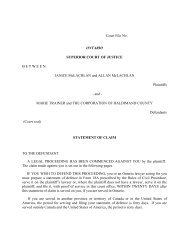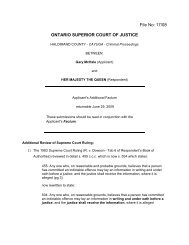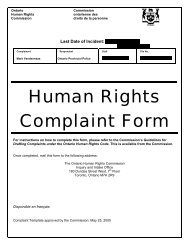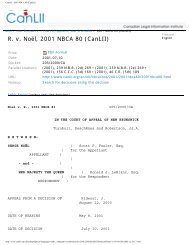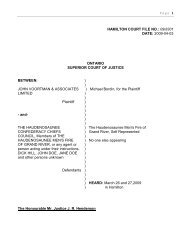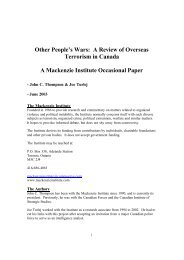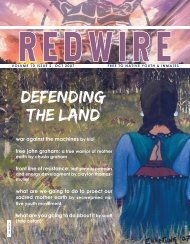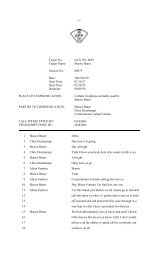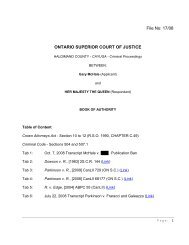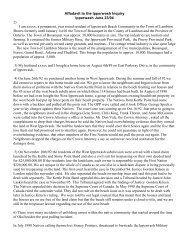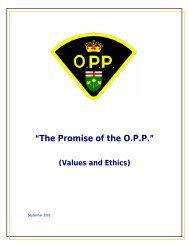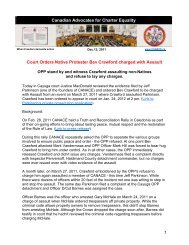Tanis Fiss, director Canadian Taxpayers Federation Centre for ...
Tanis Fiss, director Canadian Taxpayers Federation Centre for ...
Tanis Fiss, director Canadian Taxpayers Federation Centre for ...
Create successful ePaper yourself
Turn your PDF publications into a flip-book with our unique Google optimized e-Paper software.
ROAD TO PROSPERITY – Five Steps To Change Aboriginal PolicyIndeed, the arrangement gives landowners little motivation to improve theirproperty or build equity of any kind within their community. The policythereby stifles economic development, and promotes unemployment andidleness - as well as the ills that follow in their wake.Some reserves have attempted to promote economic development through socalled"customary" or "hereditary" rights. Under such an arrangement, someband councils allot parcels of reserve land to families and individuals whohave lived on that land <strong>for</strong> a long period of time. However, such in<strong>for</strong>malrights are more limited than the outright fee-simple ownership most <strong>Canadian</strong>property owners take <strong>for</strong> granted. In many cases, customary rights may beexercised only <strong>for</strong> residential or agricultural use, not commercial purposes.Moreover, although holdings can be passed on to heirs and subdivided amongfamily members, they cannot be sold to an unrelated third party. Nor can theybe seized by banks or other financial institutions, which explains why theycannot be used as mortgage collateral.Since it's the band that assigns customary rights, it's the band that handles anydisputes that arise over ownership. (The federal government does notrecognize customary rights, as such rights lie outside the purview of the IndianAct). Since owners cannot invoke the powers of the <strong>Canadian</strong> legal system toprotect their interest in a given parcel of land, they are liable to dispossessionbased on arbitrary or even corrupt decisions emanating from band councils.The link between land ownership and prosperity is well-known to economists.Yet land re<strong>for</strong>m remains elusive because <strong>Canadian</strong> governments and nativeleaders remain wedded to the idea that reserve land should be ownedcollectively. Courts have played a role as well. In 2001, <strong>for</strong> instance, the B.C.Supreme Court ruled in the case of Lower Nicola Indian Band v. Trans-CanadaDisplays Ltd. that a band council holds a fiduciary obligation to all bandmembers, and must there<strong>for</strong>e consider the rights of other bandmembers in decisions involving the use of property.In the Nicola case, a band member had claimed possession of 80 acres ofreserve land based on customary use, and had entered into an agreement witha company to display billboards on that land. After his death, his estateclaimed the property. The court, however, held that customary use did notcreate a legal interest in the land; and that until permission was given by theband or the government, the company displaying billboards would be deemedto be trespassing on reserve lands.It is also common <strong>for</strong> disputes to arise over property rights during divorceproceedings. Courts trying to divide up on-reserve property have no recourse<strong>Canadian</strong> <strong>Taxpayers</strong> <strong>Federation</strong>, <strong>Centre</strong> <strong>for</strong> Aboriginal Policy Change – 2005 9



